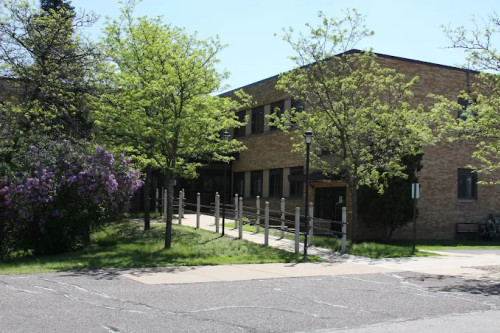

North Central Health Care Outpatient - Merrill Center
Treatment Focus
This center treats substance use disorders and co-occurring mental health conditions. Your treatment plan addresses each condition at once with personalized, compassionate care for comprehensive healing.
Primary Level of Care
Outpatient treatment offers flexible therapeutic and medical care without the need to stay overnight in a hospital or inpatient facility. Some centers off intensive outpatient program (IOP), which falls between inpatient care and traditional outpatient service.
This provider hasn't verified their profile's information. Are you the owner of this center? Claim your listing to better manage your presence on Recovery.com.
Treatment Focus
This center treats substance use disorders and co-occurring mental health conditions. Your treatment plan addresses each condition at once with personalized, compassionate care for comprehensive healing.
Primary Level of Care
Outpatient treatment offers flexible therapeutic and medical care without the need to stay overnight in a hospital or inpatient facility. Some centers off intensive outpatient program (IOP), which falls between inpatient care and traditional outpatient service.
Provider's Policy
Our admissions team will work with you to explore the right payment options based on your needs, ensuring you get the best possible treatment.
North Central Health Care Outpatient - Merrill Center
North Central Health Care Outpatient - Merrill Center
About North Central Health Care Outpatient - Merrill Center
North Central Health Care (NCHC) - Merrill center offers outpatient substance use treatment for residents of Marathon, Langlade, and Lincoln counties in Central Wisconsin. Services are available for individuals dealing with alcohol, drug, tobacco, or gambling-related issues. Flexible treatment options include individual counseling, group therapy, educational sessions, and an eight-week intensive outpatient program (IOP). Outpatient care works well for individuals who have support at home and a stable daily environment. It allows clients to receive professional care without stepping away from their everyday lives and communities.
Personalized, Evidence-Based Care
Their outpatient program tailors each treatment plan to the client’s needs and goals. Evidence-based therapies like cognitive behavioral therapy (CBT) and rational emotive behavior therapy (REBT) help clients reshape negative thoughts and build healthier emotional responses. A12-Step Recovery model and team-based approach offer structure, while group sessions foster peer support. Individual therapy provides space for deeper reflection and growth. Education on substance use triggers, relapse prevention, and substance use awareness strengthens each client’s ability to manage challenges and sustain recovery.
Flexible Support for Real Life
NCHC’s outpatient services are built for accessibility, offering day and evening sessions as well as telehealth options. Practical resources include job assistance, family education, and community referrals, helping address life outside of therapy. The center also provides state-approved assessments for those convicted of operating while intoxicated (OWI). These include legally required evaluations and individualized driver safety plans. Whether clients are facing addiction, legal requirements, or both, NCHC delivers comprehensive care and support every step of the way.
Center Overview
Treatment Focus
This center treats substance use disorders and co-occurring mental health conditions. Your treatment plan addresses each condition at once with personalized, compassionate care for comprehensive healing.
Joint Commission Accredited
The Joint Commission accreditation is a voluntary, objective process that evaluates and accredits healthcare organizations (like treatment centers) based on performance standards designed to improve quality and safety for patients. To be accredited means the treatment center has been found to meet the Commission's standards for quality and safety in patient care.

Insurance Accepted
Cash Pay Rates
Estimated Cash Pay Rate
Center pricing can vary based on program and length of stay. Contact the center for more information. Recovery.com strives for price transparency so you can make an informed decision.
Levels of Care







Your Care Options
Specializations
Alcohol
Using alcohol as a coping mechanism, or drinking excessively throughout the week, signals an alcohol use disorder.
Drug Addiction
Drug addiction is the excessive and repetitive use of substances, despite harmful consequences to a person's life, health, and relationships.
Gambling
Excessive, repetitive gambling causes financial and interpersonal problems. This addiction can interfere with work, friendships, and familial relationships.
Who We Treat
Men and Women
Men and women attend treatment for addiction in a co-ed setting, going to therapy groups together to share experiences, struggles, and successes.
Approaches
Family Involvement
Providers involve family in the treatment of their loved one through family therapy, visits, or both–because addiction is a family disease.
Individual Treatment
Individual care meets the needs of each patient, using personalized treatment to provide them the most relevant care and greatest chance of success.
Personalized Treatment
The specific needs, histories, and conditions of individual patients receive personalized, highly relevant care throughout their recovery journey.
Twelve Step
Incorporating spirituality, community, and responsibility, 12-Step philosophies prioritize the guidance of a Higher Power and a continuation of 12-Step practices.
Therapies
1-on-1 Counseling
Patient and therapist meet 1-on-1 to work through difficult emotions and behavioral challenges in a personal, private setting.
Rational Emotive Behavior Therapy
A type of cognitive therapy that identifies negative self-defeating thoughts and behaviors, rewriting beliefs to be positive, empowering, and present.
Relapse Prevention Counseling
Relapse prevention counselors teach patients to recognize the signs of relapse and reduce their risk.
Conditions We Treat
Gambling
Excessive, repetitive gambling causes financial and interpersonal problems. This addiction can interfere with work, friendships, and familial relationships.
Substances We Treat
Alcohol
Using alcohol as a coping mechanism, or drinking excessively throughout the week, signals an alcohol use disorder.
Co-Occurring Disorders
A person with multiple mental health diagnoses, such as addiction and depression, has co-occurring disorders also called dual diagnosis.
Drug Addiction
Drug addiction is the excessive and repetitive use of substances, despite harmful consequences to a person's life, health, and relationships.
Prescription Drugs
It's possible to abuse any drug, even prescribed ones. If you crave a medication, or regularly take it more than directed, you may have an addiction.
Languages
Aftercare
Care Designed for Your Needs
Special Considerations






